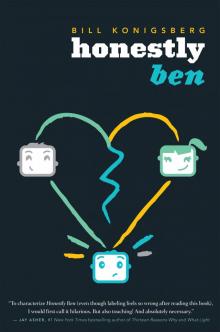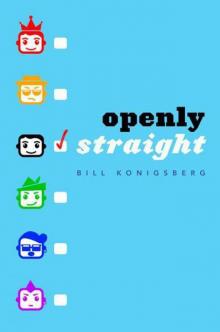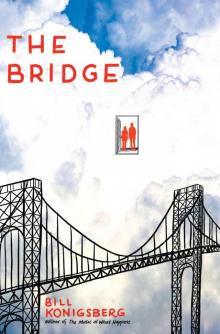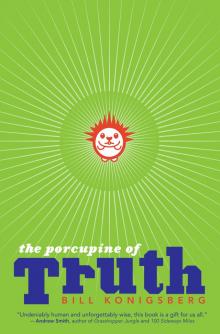- Home
- Bill Konigsberg
Honestly Ben Page 2
Honestly Ben Read online
Page 2
“Congratulations, Ben. You’re this year’s recipient of the award!”
“Me?” I said.
“Yes, you, good sir! Congratulations!”
I stared at his desk. It was like I was waiting to wake up from a dream or something. I’d never won an award before. And this one, this was a big deal. Huge. It came with a scholarship for college. Oh my God. A college scholarship!
I felt a wave of some foreign feeling sweep through my chest. “Thanks!” I said. “Thanks. Thank you.”
Taylor gave me a tight-lipped smile and ran his hands through his graying hair. “You are very welcome, sir. We don’t take this lightly around here. Your teachers and your coach all had glowing things to say about you, and it simply can’t be denied, Ben. Everyone likes you. You’re a gifted young man, and you have a very bright future. The foundation was quite pleased when they heard us talk about you.”
You can’t cry in moments like these, but it felt like a definite possibility. I felt dizzy and light and giddy, like my body didn’t know how to react.
“Thanks,” I said again. “Thanks.”
“Now, it’s provisional. The foundation has certain requirements that must be met throughout your time at Natick. For that reason, we will alert a runner-up. I don’t anticipate a problem, but I want to make sure you’re aware. You must abide by the code of conduct and remain among the top ten percent of the class in terms of GPA.” He looked down at some papers in front of him. “Now, I saw that last semester, you took a dip in calculus.”
“Yes, sir. But I’ll do better this semester. I promise.”
“Good. I think you’ll want to stay above a three-point-seven to stay in the acceptable range.”
I nodded and nodded, and in that moment, I promised myself I wouldn’t take on anything new that could get in the way of focusing on my studies. Nothing could be more important than that.
“Also, the foundation was really impressed with your activities. As long as you keep playing baseball and doing Model Congress, I think you’ll be fine there.”
“Yes, sir.”
He smiled at me again. “The assembly will be the Friday before spring break. You’ll give a speech, and then you’ll receive the Pappas Foundation’s four-year scholarship. Now, it’s a partial scholarship, and I know you may well need more aid, but you wouldn’t be the first Natick student to pair it with another scholarship or grant. You’ll focus on that next year with your advisor.”
“Thanks,” I said again. “This is amazing.”
“Your speech should pay homage to Pappas. You should also share a little bit about your life plans and goals. Kyle did such a nice job last year.”
I nodded. I remembered the speech. It had been very good.
“Good man. We’d love it if you invited your family down from New Hampshire. And a large wooden plaque with your name and your picture will be placed in the hallway of the main building, next to all the other winners.”
Me. A plaque with my name and face. I felt full. That’s what I felt. Full and deeply grateful. I didn’t want to get weird, so I just said, again, “Thanks. Thank you. Thanks.”
He gave me a hearty handshake, and after I left the office, I nearly sprinted across the quad, feeling ticklish, like parts of my body I’d never felt before were all now very awake and alive.
The Pappas Award recipient. Me.
Back in my room, I called my parents.
“Mom,” I said. “I won the Peter Pappas Award.”
“Oh. What’s that?” she asked.
“It’s a scholarship. Well, it comes with one, for college. Partial, but still. It goes with an all-around student award they named after this guy who died. It’s a … kind of a big deal.”
“Oh! Well! Isn’t that nice, Benny!”
“Yeah,” I said, laughing. “Imagine that! I never won an award before.”
“That’s terrific, Benny. Let me tell your father.”
My throat got tight. I knew she’d tell him, obviously, but I wasn’t sure if I could take it right now, him telling me to not get a big head.
My mother said, “Richard! Ben won a big award!”
I braced for the letdown.
“You don’t say?” I heard him say. “Let me talk to him.” He took the phone. “What’s this, Benny?”
“I, um, won this award. It’s not, like, a huge deal, but … it’ll pay for some of my college. I mean, there’s a scholarship. It’s called the Peter Pappas Award. Named after a guy who volunteered to fight in Vietnam and died there. He was a great all-around kid, very popular, good athlete, good student. Good guy. They’ll put up a plaque with my name and face on it, I guess.”
I heard a noise that I hadn’t heard too much in my life: my dad chuckling. “Well, I’ll be,” he said. “Ben Carver, award winner. I am so damn proud of you, Benny!”
I couldn’t help it. I gasped, and then I turned it into a cough, as if the gasp had been me clearing my lungs. I just couldn’t remember my dad ever saying that before. But I sucked my feelings down and said, “Thanks. Thanks. I guess they want you to come for the ceremony. It’s the Friday before spring break? If you can, I mean.”
“Well, I’m sure we can get some help here on the farm and get on down there, sure,” he said.
“Maybe you can stay over? Stay in a hotel?” I surprised myself. I never suggested anything that would cost my dad money, because I knew he’d tell me that he wasn’t made of money. But for once I wasn’t in control of my mouth.
“Well, then. Maybe,” he said. “Maybe we’ll do just that.”
I got off the phone with this full feeling I wasn’t used to in my chest. I imagined my dad, at the store, telling the Stevensons, maybe, or the Majkowskis. Yeah, we’re heading down to Massachusetts tomorrow. Gonna close the store, even. My boy Benny’s getting an award. I’m so proud of him!
I shivered. Careful, I told myself. You don’t want to set yourself up for a fall. Be happy. Just not too happy.
A pounding on my door woke me from a deep, upright sleep.
“What?” I groaned, rolling my neck to fix a kink in it. It was my first Monday night back at Natick, and after finishing up homework, I’d fallen asleep in the burgundy desk chair Bryce left me when he withdrew from school last semester. I wiped the sleep from my eyes and looked at my phone: 1:44 A.M. On the windowsill outside, several inches of snow had piled high, and I remembered I’d fallen asleep watching the snowstorm.
“Blizzard Bowl, baby!” the voice yelled, and I managed a sleepy smile. It was definitely Steve Nickelson’s voice, and this was a great Natick tradition. Once a year, we celebrated the end of the season’s first blizzard with a pickup football game at whatever hour the snow stopped. My freshman year, the blizzard ended during class, and we’d simply walked out, no explanation necessary. Headmaster Taylor even played with us. Last year it was a night game, and I liked that one better; there was something delicious about moonlit snowflakes, the way you could see actual grains of snow if you stood under one of the streetlamps lining the path.
“I’ll be right down!” I yelled, and I could hear Steve stomp off and bang on the next door. I jumped up, suddenly wide-awake, and bundled myself up in layers. The other kids might have the newest in boot technology and snow pants, but somehow I was never the first one to whine about the cold. Sometimes old and ratty gets the job done best, I thought, looking at the olive-green work gloves I’d gotten as hand-me-downs from my dad in ninth grade.
Outside, the snow was knee-deep, and as I stepped into a virgin pile, I felt the sweet chill curl into my calves. After last year’s game, Bryce had lent me an extra blanket and we’d drunk hot chocolate in the dark. It still was a few hours before I thawed out. That was how I was built; it took a while for the cold to seep in there, but once it got to my bones, it would stay.
“Yo, Ben!” this kid named Standish called over. He had stringy blond hair, and the probability that he would move to Southern California and be a surf instructor in his twenties was 1
00 percent. “What up, Blood?”
I tromped through the snow toward the others. “Hey,” I said. Each step was work, as I had to dig my already sopping boots out of the pack, then break through the crust of an untouched snow blanket.
“Congrats on the Pappas,” Standish said, and I mumbled, “Thanks.” Word had gotten out about the award sometime before lunch, and people had started to congratulate me. I wasn’t used to the kudos, and truthfully I was looking forward to that part being over.
“Yeah, congrats, dude,” this senior named Tommy Mendenhall said. Tommy was shortstop on the baseball team, and last year I’d played varsity third base. Other than some monosyllabic orders on the baseball field, he’d never uttered a word to me before.
“Thanks, thanks,” I said, picking imaginary lint off my jacket.
“You ready for some serious baseball?” he asked. “Big year for us.”
I smiled. “Absolutely. Can’t wait.”
I’d been looking forward to the first practice for a month, and now it was about twelve hours away. If you wanted to play baseball here, you couldn’t play basketball, because practice began in January, three months before actual games. The reason was the spring break tournament. Each year, Natick was one of the very few northern schools to participate in a weeklong tournament in Fort Lauderdale. The varsity players got to stay at a nice hotel, eat in cool restaurants, and even go to the beach while they were down there. It was one of the reasons our basketball team sucked rocks.
I’d been one of four sophomores to play varsity last year—Steve was one of the others. But when it had come time for the tournament, I couldn’t go for financial reasons. It kind of stunk, because when the guys came back, they had all bonded and I felt like an outsider. This year, Coach Donnelly said he hoped to find some funds for me.
“Where’d you go over break?” asked Zack, our left fielder. He was short and looked nearly orange from tanning on whatever rich people’s island his folks had taken him to for Christmas.
“Home,” I said. “New Hampshire.”
“Your family didn’t do anything special?”
I stared at Zack. To me, being home with my family is special.
“All right. Good talk,” Zack said, turning away from me. The guys were used to me not saying much, and I was used to them giving me a little shit about it.
Steve gave Zack a chest-bump, and the guys started talking about the Boston Bruins. I stretched out my still sleepy legs.
“Carver.” Steve came up behind me and hit my back with his forearms.
“Yo,” I said.
“We gonna kill it this year?”
“Yes. It’s going to be dead,” I said, and he laughed. A lot of the guys were dolts—Steve included—but they were my dolts.
Perhaps because it was two in the morning, only the true Blizzard Bowl fanatics had shown up. I was teamed with Steve, Zack, and Mendenhall. We got the ball first. Mendenhall called quarterback.
“Flag, twenty yards,” Mendenhall barked my way, and I nodded. Flag meant go straight and then angle out toward the sideline and end zone.
Mendenhall called hike, and that’s when we all remembered: The idea of Blizzard Bowl was always better than the game itself. I attempted to run through the knee-high drifts, but it was impossible. We started laughing as the sense memory kicked in. Zack tried to make it look like he was running by exaggeratedly swinging his down jacket–enclosed arms, but really he was walking too. And there was the slight issue of sight, since the brown leather ball could barely be seen except when under one of the streetlamps.
Mendenhall rifled the ball toward Steve, who had run-walked toward one of the lights and yelled, “Throw it here.” The ball slipped straight through Steve’s hands and landed fifteen feet behind him. It drilled the snow like a diagonal missile and disappeared, and a search and rescue mission commenced, with a guy from the other team finally coming up with the ball plus a face full of snow.
Both teams began to realize that the only way to complete passes was to throw short and toward the sideline where the lights were, and after a while the game degenerated into a game of catch and trash talk about local Natick townie girls.
“You gonna tap that ass?”
“Who? Allie? That trick? Fuck that bitch, yo.”
Things tended to get a little hip-hop when all the guys got together, which made no sense, as we were all white and, other than me, exceedingly wealthy. I wondered if we could get a transcript of one of these conversations, and perchance have a social anthropologist sound off on it, or post it on the school website for prospective students, so they could all decide whether they could hang, yo.
That would have been helpful for me, for instance. Because while I can hang, yo, the reason is a little weird.
I’m big.
When you’re a big guy, people just assume you fit in. They assume you run things, that you’re in control, that you know what to do. I’ve noticed that if I don’t say anything, people will continue to assume these things about me. Because I am athletic, because I have broad shoulders—farm work, by the way, not the gym—other guys salute me wherever I go. I get reverential nods.
I appreciate that it makes my life easier. But it also means that people don’t really get me. They don’t know what’s up in my brain. I think, maybe, when you’re a big guy, it’s assumed your intellect is not as important as whether you can throw a ball.
We soon tired of digging for lost footballs and gave up on the game. I was walking with the others toward the dorm when some familiar laughter grabbed my attention. I could barely see, as the lights were now well behind us all, but I could hear it, about twenty feet to my right. It was the inimitable, melodic, high-pitched giggle of Toby Rylander, matched with the thundering chortle of Albie Harris. I stopped.
“You coming, Carver?” Mendenhall yelled.
“Go on without me,” I said, bending down, pretending to tie my boots, which were well under the snowpack. They kept walking.
My sort-of friendship with Toby and Albie was part of the brain-dead Rafe haze I’d been in the previous semester. Toby and Albie were such a weird duo; it was as if they spoke an alien language. And while they could be amusing, they were also annoying. The first time I drove somewhere with them, I distinctly remember this one time, as we were pulling out of the school parking lot, when Toby, wearing a fake mustache, announced he was a crime reporter. In the end there were way more fun moments than weird ones. But that friendship was in the past, with the rest of the Rafe wreckage. It belonged there.
Yet I moved toward them as if on autopilot, and soon I could make their shapes out in the moonlight. I could barely see what they were doing, but it appeared they were clearing a circle, building a huge wall of snow all around them. Then I saw an indentation in the snow, on the opposite side of their snow wall, and I realized that of course there weren’t just two of them. There were three.
My pulse went rogue on me. Wild, crazy, strange, nonsyncopated beats. I felt my heart soar, and then plunge, and then soar again. I hadn’t been pulled toward Toby and Albie; subconsciously it was Rafe I’d wanted to see, and that was just crazy.
I slowed my pace but continued walking, and sure enough, there was Rafe, illuminated by the moonlight and the light of the snow, all bundled up, about six inches below the powder surface. He was making a snow angel.
He was wearing the same bright red jacket and black hat he’d worn when we’d gone skiing in Colorado over Thanksgiving. I flashed on Rafe skiing in front of me, his legs moving from side to side like a pendulum while his upper body stayed totally still. On the long chairlift rides, his visible breath dissipated into the cold mountain air, while everything around us felt crisp and clear and right.
It had been one of the happiest days of my life.
But that was then. Now my insides were all messed up about it, and I knew if I let myself feel even a little bit of that it would be a lot, and I didn’t have room for a lot anymore. It might break me in two, and I was
a big guy, and big guys who play baseball don’t break in two. I wished I could just disappear.
“Snow angels have no place in an igloo community,” Toby said.
Rafe kept making his arm and leg motions. I could hear them scraping the snow. “Maybe igloos have no place in a snow angel community,” Rafe yelled.
“Snow angel community. There are no communities of snow angels. There are flocks. Everyone knows that.” This was Albie, who was currently carving a pile of heavy snow into bricks.
I shifted my frigid legs, and it made a sound, and I silently cursed my stupid, thick body. Toby looked over, and it took a moment for him to see me, but then he gave a tiny, tentative wave, the kind of wave you give someone you’re not sure if you’re friends with anymore. We hadn’t spoken since Thanksgiving, when everything blew up.
“I think there could be communities of snow angels that have yet to be discovered,” Rafe said, hoisting himself up from his angel shell with his arms. That’s when he saw me standing there, maybe fifteen feet away.
Rafe smiled, a questioning smile, like, Can we be okay, please?
No. Yes. No. I didn’t know.
Part of me wanted him to burn for putting me through everything I’d felt since then. The sleepless nights; the need to talk to someone when there was absolutely no one, no one who would understand. And another part of me? No way no how did I want Rafe to think I hated him. I wasn’t sure what I wanted, but my mouth naturally curves down into a frown, and I didn’t want to frown at Rafe. So I flickered my mouth just a bit, and Rafe’s face lit up into a tentative smile, but then I adjusted back into what I figured was a neutral expression, and his face unlit.
“Hey, Ben. Congrats on the award,” Albie said, and I nodded. “We need builders,” he added, looking at me, and I realized that Rafe must not have told them about what had happened between us. A part of me wanted to reach out and hug him for protecting me, but the bigger part of me, the thick part that sinks in water, stayed totally still.
“So cold,” I said. “I’m gonna … ”

 Honestly Ben
Honestly Ben Openly Straight
Openly Straight The Bridge
The Bridge The Porcupine of Truth
The Porcupine of Truth